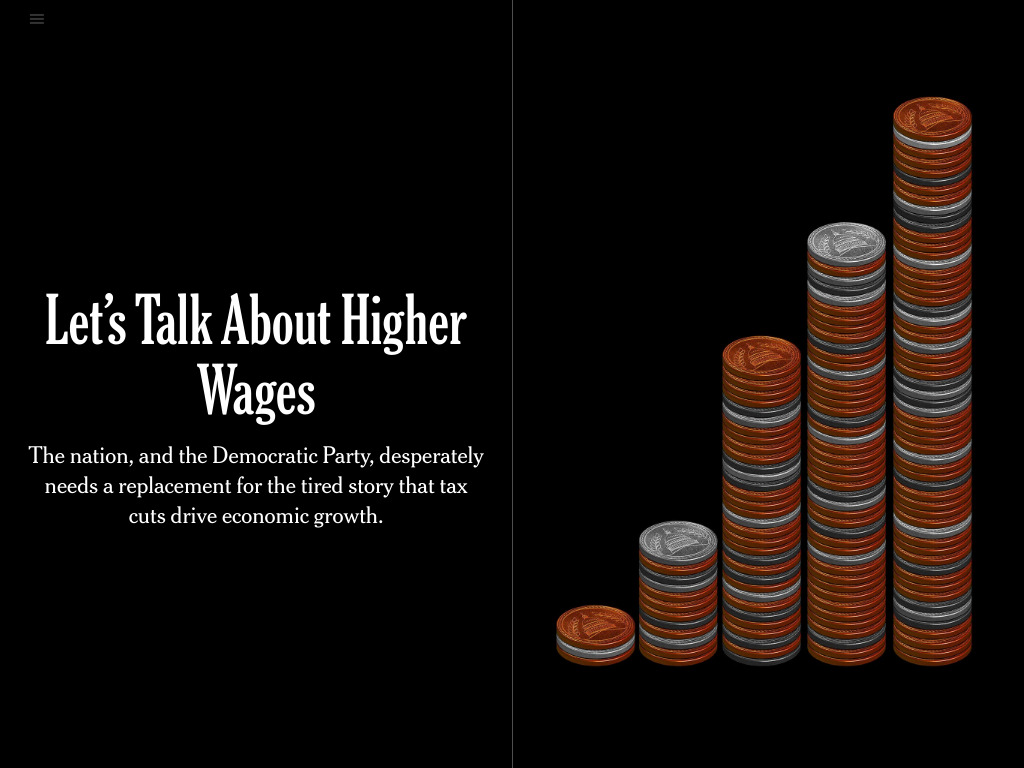The affluent live in growing isolation from other Americans, which makes it harder for them to imagine themselves as members of a broader community. Their companies derive a growing share of profits from other countries, which makes it easier to ignore the welfare of American consumers.
Excellent job completely disproving your thesis here, NYTimes
Yeah, the rich have completely divorced their ability to accumulate Capital and live decent lives from the material conditions of American worker. They should totally care anyway, though, because of historical arguments that we just said are no longer valid.
This actually seems like a very muddled article. It seems to start out by suggesting that the reason we should push for higher wages is because it is an inherent good in itself. That is an interesting angle, you wouldn't really expect it to be present in much but a marginal, feel good op-ed. But then the NYT claims that those arguments are only the familiar ones, and the argument they want to focus on is how it helps growth. Like, these two paragraphs are right next to each other:
Raising the wages of American workers ought to be the priority of economic policymakers and the measure of economic performance under the Biden administration. We’d all be better off paying less attention to quarterly updates on the growth of the nation’s gross domestic product and focusing instead on the growth of workers’ paychecks.
Set aside, for the moment, the familiar arguments for higher wages: fairness, equality of opportunity, ensuring Americans can provide for their families. The argument here is that higher wages can stoke the sputtering engine of economic growth.
Doesn't the first one seem like it is repudiating the view of the one that follows it? "We should stop caring about growth and GDP, but forget that sentence you just read, I'm going to tell you why you should still care about GDP." I feel like I got hit across the head.
But aside from that weird editorial choice which kind of continues throughout the article (it seems to hop back and forth on whether high wages are just good, or whether they need to be justified by growth), I'd actually say the article is just badly framed and wrong regardless. It isn't surprising because it is the NYT, but I feel compelled to criticize it because they're clearly trying to diffuse leftist energy by placating it or reconstituting it into their brand of liberalism. Unfortunately it isn't the case that high wages "boost the economy". To the extent that they do, it is temporary. The new economic consensus was more in response to this reality than anything, even though the NYT seems to suggest the market fundies and neoliberals were arguing for tax cuts because it would help wages. Profits drive reinvestment, and weakening returns make it seem riskier. From a Marxist perspective, wages cut into profits, because the surplus is actually created in the production process, only realized at the point of exchange. Profit is a cut of the pie, and when you keep increasing the relative share of the social surplus going to labor you decrease the share going to capital, which can have the tendency to slow growth and lead to crises in the long run because the profit signal driving reinvestment is being dampened. All surplus comes from labor, the difference between what labor gets paid for its ability to work and the actual value of the stock of commodities they produced.
Which of course is not to say it is then bad to advocate for higher wages, but it is a dead end that also leads to consequences in reality which beget the counterargument that there is a ceiling to wages which is impossible to break through without maintaining growth. The maintenance of the myopic view of the economy is counterproductive, in terms of its supposed goal it directly defeats the NYT's meandering point that it is valuable to reframe the understanding of the economy to the public in order to produce better policy, because that road leads to confusion and capitalist realist resignation to market forces. In fact, the NYT itself gives a glimpse into what I'd unironically call the radical liberal solution to the problem that is consistently hidden from view or simply considered too unrealistic, even though it is not totally unknown:
For decades, mainstream economists insisted that it was impossible to order up a sustainable increase in wages because compensation levels reflected the unerring judgment of market forces. “People will get paid on how valuable they are to the enterprise,” in the apt summary of John Snow, the Treasury secretary under President George W. Bush.
That quote is the actual economic orthodoxy on the question. The belief of the neoclassicals is basically that economic production is made of inputs that go into a box and when mixed together the box ejects output. "The enterprise" is the private entity that efficiently allocates each input such that output is maximized. They think that labor is just another input, like land or capital, and so it is only the private enterprise in concert with myriad other private enterprises calculating their own production functions that can determine the optimal allocation for maximization of social wealth. In the normative sense, such models are treated as though they justify the distribution of income to the inputs in the manner John Snow said, that people get paid exactly as much as is required to maximize economic output, and so they're paid "what they're worth".
What goes entirely unexamined by most people who just kind of imbibe this model of the economy, which many people have in an ambient way if not through an actual economics degree or something, is that while the ownership of the output is vested in the private enterprise, there is nothing in the models that inherently prescribes the ownership structure of the private enterprise itself. This is one reason why Marx and Engels considered the expansion of joint stock companies an interesting and progressive development, because it was making absentee ownership more common. Firms were becoming social institutions which were divorced of connection to big private owners directly making decisions. This idea was developed later in the term "Managerial Capitalism", that big corporations were being run by salaried professionals rather than owners. This would seem to reflect some of the developments that led to events like the French Revolution, in which the growing group of professional and educated members of the Third Estate felt themselves more capable if not already the true decision makers in French society, and the aristocracy was just an arbitrarily parasitic group of lazy assholes. But of course, the minority of managers of capital aren't a revolutionary class, their revolution so far has been using their power for nicer compensation packages.
Anyways, I bring up the development of Managerial Capitalism because it pointed to the fact of the matter already recognized by the actually existing market, which is that if private enterprises are black boxes that blend the inputs and maximize the outputs, operation vs. ownership is ultimately inconsequential. Therefore, minority ownership over the surplus actually isn't justified by economistic modelling, even if you accept that private enterprises are the engines that maximize growth. So there is a false dichotomy here between the determinants of growth and the wealth disparity. It is simply assumed that private enterprises are owned by private capitalists. In fact, they could be owned by the workers in the firm while maintaining the neoclassical production function, and you'd both secure the power of labor that the NYT article mentions as necessary for wage increases, as well as to an almost unthinkable degree right now end the inequality that exists in American society. Furthermore, it isn't even a communist position. The market and private enterprise are all maintained. But it would be decried as a communist position that the market should transition into cooperatives because the goal for either the NYT or for the liberal establishment is obviously not the prosperity of the American people as some kind of unity, it is to keep the peace between capital and labor such that capital can continue to exploit labor without any fuss.
Quelle surprise, le journal officiel soutient les cochons capitalistes



